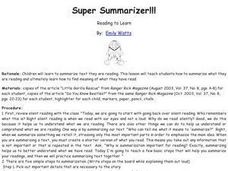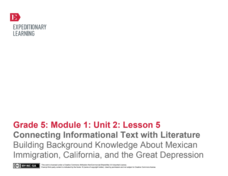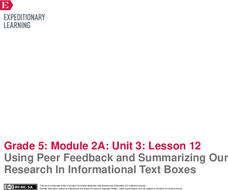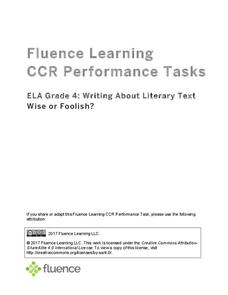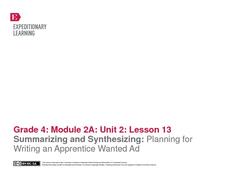E Reading Worksheets
Summarizing Text
Help learners find the most important information in a text with a lesson on summarizing. As kids read through a passage about Johannes Gutenberg, they summarize small excerpts, put events in sequential order, and respond to two longer...
Curated OER
Retell And Summarize Text
Help your learners read a text and summarize it using their own words. The main idea and important details of an article are discussed before individuals write their summaries. To support discernment about what to include in a summary,...
Polk Bros Foundation
How to Summarize a Non-Fiction Passage
After reading a text, one way to find out how much your class comprehended is to ask your pupils to summarize. This worksheet helps class members prepare for writing a summary of a nonfiction text. They note down the topic, up to eight...
CC Homestead
Summarize
Designed for third graders but appropriate for older learners as well, this packet of materials underscores the necessity of teaching kids how to summarize, how to identify main ideas and supporting details, and how to ask questions...
K20 Learn
Annotating a Text: Style and Syntax
If you have a favorite author, you probably recognize their style. Conduct a close read of the text, marking it up as they go. Collaborative sharing time and a summary writing prompt follow the main activity.
EngageNY
Analyzing Text Structure & Summarizing Text: “Equal Rights for Women” by Shirley Chisholm
Let me check my schedule! Scholars set up discussion appointments with five classmates to discuss Shirley Chisholm's speech "Equal Rights for Women." Readers then use their Note Catcher guides to analyze the text of the speech more...
Curated OER
Super Summarizer!!!
Emerging readers summarize a nonfiction text using a five step process. After a brief demonstration of the five-step method for summarizing text, they read a nonfiction article and write their own summary. A checklist of each summary is...
Worksheet Web
What did it Say? – Summarizing
Provide scholars with an opportunity to practice summarizing text with a two-page learning exercise. Learners read poems, share stories with their peers, and summarize their new-found-knowledge.
Curriculum Corner
Informational Text Graphic Organizers
Scholars delve into an informational text with the help of four pages that focus on the author's purpose, vocabulary words, summarization, and main idea.
Syracuse City School District
Summary of Fiction and Non-Fiction Text
Somebody Wanted But So Then (SWBST)? Yes! Here's a great strategy for teaching young readers how to summarize narrative text. In addition, the packet includes exercises that show kids how to summarize nonfiction text using the classic...
Curated OER
In-Text Citation
Wow! Here's a comprehensive look at the world of plagiarism. Types of plagiarism are defined, examples are shown, and in-text examples are highlighted. Being 75 slides long, this presentation is slightly overwhelming. Consider dividing...
Curated OER
Comprehension: Create a Summary from an Expository Text
Children can learn to analyze expository or informational texts at nearly any age. This scaffolded and scripted resource provides teachers with the support needed to facilitate a thoughtful lesson on summarizing informational text...
Curated OER
Paraphrasing and Summarizing
Read an article about the migration of our ancestors and write a paragraph. Pupils paraphrase and summarize to restate the information found in a nonfiction text. They write a shortened version of the reading to demonstrate the...
Curated OER
Persuasive Arguments
Examine persuasive writing using this informational excerpt about natural habitat conservation. Readers examine the headings of three paragraphs to determine their effect, then copy the first sentences of each. They use these topic...
EngageNY
Connecting Informational Text with Litearature: Building Background Knowledge About Mexican Immigration, California, and the Great Depression
Help your class transition as the setting in the novel Esperanza Rising, by Pam Muñoz Ryan, moves from Mexico to California. Beginning with prior knowledge, and moving into jigsaw research groups, class members add to and create posters...
EngageNY
Using Peer Feedback and Summarizing Our Research In Informational Text Boxes
Insert text box here. Learners use index cards to create their own informational text boxes. The text box includes information about an insect in the rainforest. Scholars also complete the draft of their research science journal entries.
Baruch College Writing Center
Summarizing, Paraphrasing, and Quoting Workshop
What's the difference between summarizing and paraphrasing? Show class members how to find the main ideas from informational text and condense it, restate it, or quote it directly with a series of educational activities based...
cordovla.weebly.com
Summarizing, Paraphrasing and Quoting
How skilled are your class members at summarizing, paraphrasing, and quoting from a text? Find out with this assessment that asks readers to identify the thesis statement, the summary, the paraphrases, and the quoted material in an...
K12 Reader
Summarize It: President Theodore Roosevelt's 7th Annual Message to Congress
How did Theodore Roosevelt stress the importance of conservation during his time as president of the United States? Take a closer look at the language Roosevelt used himself in a 1907 address to Congress, and have your young...
EngageNY
Mid-Unit 3 Assessments, Part 2: Summarizing, Analyzing and Discussing Research
Why is reading important? As part of the mid-unit assessment, scholars read, summarize, and analyze an article about the importance of reading. Additionally, they continue their discussion about whether their rules to live by should be a...
Florida Center for Reading Research
Comprehension: Expository Text Structure, Text Feature Find
Scholars explore an expository text to answer questions about its structure.
Fluence Learning
Writing About Literary Text: Wise or Foolish?
A three-part assessment promotes reading comprehension skills. Class members read literary texts and take notes to discuss their findings, answer comprehension questions, write summaries, and complete charts.
EngageNY
End of Unit 2 Assessment: Working with Two Texts - Reading, Listening, Summarizing, and Synthesizing
As a summative assessment for this unit on colonial trade, fourth graders listen to and read informational texts in order to demonstrate their ability to take notes, write summaries, and draw connections. Young scholars first listen as...
EngageNY
Summarizing and Synthesizing: Planning for Writing an Apprentice Wanted Ad
In instructional activity 13 of this unit on colonial trade, young researchers learn about apprentices as they prepare to write help-wanted ads for the specific trade they have been researching. To begin, the class listens closely as the...
Other popular searches
- Summarizing Text Worksheets
- Free Summarizing Text
- Summarizing Text 3rd Grade
- Summarizing Text 2nd Grade
- Summarizing Text Samples
- Summarizing Text 7th Grade
- Summarizing Text Activities
- Summarizing Text Sheets
- Summarizing Text Content
- Summarizing Text Key Points
- Summarizing and Text Structure
- Text Comprehension Summarizing








